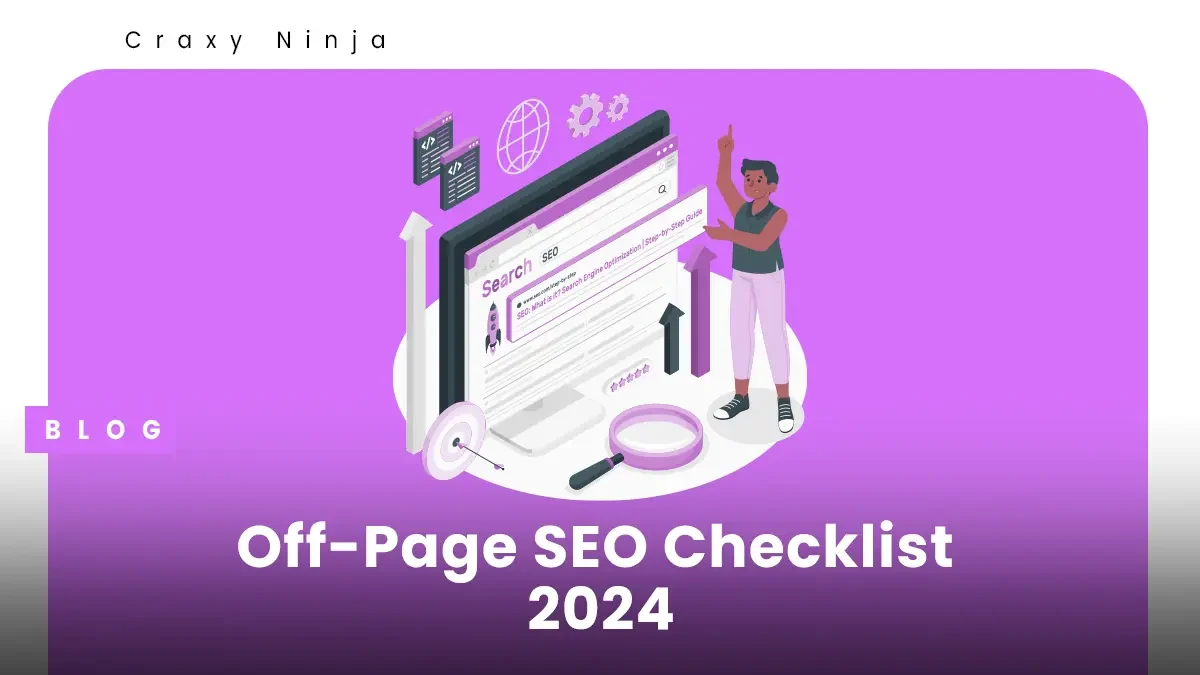When it comes to boosting your website’s visibility and authority on search engines, Off-Page SEO is a game-changer. While On-Page SEO focuses on optimizing your website itself, Off-Page SEO involves strategies beyond your site that enhance its credibility and relevance in the digital landscape. In this guide, we’ll dive into a comprehensive Off-Page SEO checklist, accompanied by a selection of tools to amplify your efforts.
Understanding Off-Page SEO: Beyond the Horizon of Your Website
Off-Page SEO encompasses a myriad of external factors that influence how search engines perceive your website. The primary goal is to build a robust online presence and reputation, earning trust and credibility in your industry. Let’s embark on a journey through the key elements of an effective Off-Page SEO strategy.
Quality Backlinks: The Backbone of Off-Page SEO

Quality backlinks are the backbone of a robust and successful search engine optimization (SEO) strategy. In the vast landscape of the internet, these links serve as digital endorsements, signaling to search engines that your content is credible, authoritative, and worthy of attention. In this exploration, we will delve into the essence of quality backlinks, why they matter, and how to strategically acquire them.
Why Backlinks Matter
Backlinks, or inbound links from other websites to yours, are like digital votes of confidence. Search engines view them as a signal that your content is valuable and trustworthy.
Off-Page SEO Checklist
Natural Link Building
Focus on creating high-quality, shareable content that naturally attracts backlinks.
Diverse Link Sources
Seek backlinks from a variety of reputable domains. A diverse link profile is more appealing to search engines.
Avoid Spammy Backlinks
Disavow or remove any low-quality or spammy backlinks that could harm your site’s reputation.
Tools for Backlink Analysis
Analyzes your backlink profile, helps identify new link-building opportunities, and provides insights into competitor backlink strategies.
Moz Link Explorer
Offers detailed backlink analysis, including spam score, anchor text distribution, and domain authority.
Social Signals: Amplifying Your Online Presence

Social signals refer to the collective engagement and interactions a piece of content receives on various social media platforms. These signals include likes, shares, comments, and overall social media visibility. While social signals may not be direct ranking factors in search engine algorithms, they play a crucial role in amplifying content reach, building brand awareness, and indirectly influencing SEO. Let’s delve into the significance of social signals in the digital landscape.
Why Social Signals Matter
Social media activity around your content can impact its visibility. While social signals may not directly affect rankings, they contribute to content discovery and brand exposure.
Off-Page SEO Checklist
Active Social Profiles
Maintain active profiles on major social platforms relevant to your industry.
Content Sharing
Share your content on social media to increase its reach and encourage engagement.
Social Bookmarking
Submit your content to popular social bookmarking sites for broader exposure.
Tools for Social Signals
Hootsuite
Schedule and manage social media posts across multiple platforms.
Buzzsumo
Identifies popular content in your niche and helps you discover influencers for potential collaboration.
Online Reputation Management
Online Reputation Management (ORM) is a crucial aspect of digital strategy that focuses on shaping and influencing the public perception of an individual or a brand on the internet. In an era where information travels swiftly and opinions can be formed with a simple online search, managing how you or your business is perceived online is paramount. Let’s delve into the significance of Online Reputation Management, why it matters, and strategies to maintain a positive digital image.
Why Online Reputation Matters
Your online reputation directly influences how users perceive your brand and affects their decision to engage with your website or content.
Off-Page SEO Checklist
Monitor Reviews
Regularly check and respond to reviews on platforms like Google My Business and industry-specific review sites.
Brand Mentions
Monitor online mentions of your brand and respond to both positive and negative mentions.
Tools for Reputation Management
Google Alerts
Sends email notifications when your brand is mentioned online.
Reputology
Specifically designed for monitoring and managing online reviews.
Influencer Outreach: Leveraging Industry Authority

Influencer outreach is a dynamic and effective strategy in digital marketing where brands collaborate with influencers to promote products, services, or messages. These influencers, often with a substantial following on social media or other online platforms, have the power to reach and influence a specific target audience. Let’s delve into the significance of influencer outreach, the benefits it offers, and strategies to execute successful influencer marketing campaigns.
Why Influencer Outreach Matters
Leveraging influencers in your industry can amplify your content reach, enhance credibility, and attract a larger audience.
Off-Page SEO Checklist
Identify Influencers
Find influencers in your niche who align with your brand values.
Collaborate on Content
Work with influencers on content creation, co-authorship, or feature them in your content.
Tools for Influencer Outreach
Traackr
Assists in identifying influencers, managing relationships, and measuring the impact of influencer collaborations.
Buzzstream
Streamlines influencer outreach and relationship management.
Guest Posting: Sharing Expertise Beyond Your Domain

Guest posting, also known as guest blogging, is a content marketing strategy where individuals or businesses create and publish content on other websites or blogs. This collaborative approach offers mutual benefits, allowing the guest author to reach a new audience and the hosting site to feature fresh, diverse content. Let’s explore the significance of guest posting, its benefits, and effective strategies for successful guest blogging.
Why Guest Posting Matters
Contributing content to other reputable websites not only builds backlinks but also establishes you as an authority in your field.
Off-Page SEO Checklist
Identify Opportunities
Seek guest posting opportunities on relevant websites in your industry.
Quality Content
Create high-quality, informative content that adds value to the host website’s audience.
Tools for Guest Posting
Pitchbox
Automates and streamlines the guest posting outreach process.
Ninja Outreach
Helps in identifying and connecting with potential guest posting opportunities.
Local SEO: Enhancing Visibility in Your Geographic Area
Local SEO (Search Engine Optimization) is a specialized strategy focused on optimizing a business’s online presence to attract local customers. With the increasing prevalence of mobile searches and location-based services, Local SEO has become a critical component for businesses seeking to enhance their visibility in local searches. Let’s explore the significance of local SEO, its key elements, and effective strategies to boost your business’s local online presence.
Why Local SEO Matters
For businesses with a physical presence, optimizing for local search ensures that users in your area can find and engage with your services.
Off-Page SEO Checklist
Google My Business
Claim and optimize your Google My Business listing with accurate information.
Local Citations
Ensure consistent NAP (Name, Address, Phone Number) across online directories.
Tools for Local SEO
Moz Local
Manages and maintains local business listings across various platforms.
BrightLocal
Provides tools for local search audits, tracking local rankings, and managing online reviews.
User Experience (UX) Optimization: Retaining and Delighting Visitors
User Experience (UX) optimization is a critical aspect of web design and digital marketing that focuses on enhancing the overall experience users have when interacting with a website or application. A positive user experience not only contributes to customer satisfaction but also plays a crucial role in influencing factors such as conversion rates, user engagement, and brand loyalty. Let’s delve into the significance of UX optimization, key elements to consider, and effective strategies to create an exceptional user experience.
Why UX Optimization Matters
A positive user experience not only keeps visitors engaged but can indirectly impact your site’s SEO through factors like dwell time and low bounce rates.
Off-Page SEO Checklist
Mobile Optimization
Ensure your website is mobile-friendly for users on various devices.
Fast Page Load Times
Optimize images, use browser caching, and employ content delivery networks (CDNs) to enhance page load speed.
Tools for UX Optimization
Google PageSpeed Insights
Analyzes your website’s page speed and provides suggestions for improvement.
Hotjar
Offers tools for tracking user behavior, including heatmaps and session recordings.
As we navigate the vast realm of Off-Page SEO, it’s evident that success requires a multifaceted approach. By implementing the strategies outlined in this checklist and utilizing the recommended tools, you can not only boost your website’s authority and visibility but also establish a lasting and positive online presence.
Remember, the digital landscape is ever-evolving, so staying informed about industry trends and search engine algorithms is key to maintaining a successful Off-Page SEO strategy. Now, armed with knowledge and tools, venture forth and unleash the full potential of Off-Page SEO to propel your website to new heights in the digital realm.








